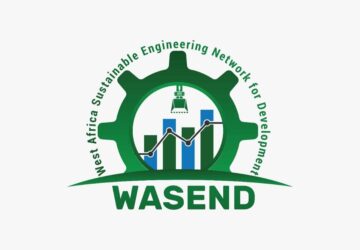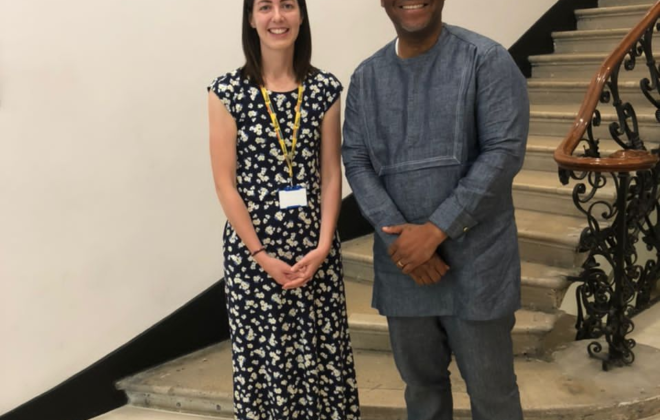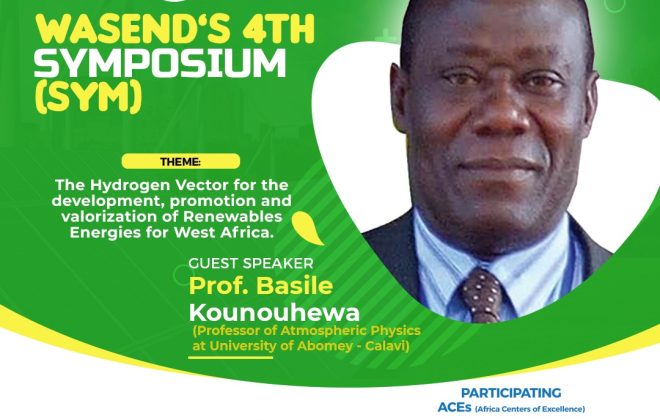ARTICLE ON WASEND 4TH CAPACITY BUILDING WORKSHOP
Engineers Urged to Develop Innovative Projects at the 4th WASEND Capacity Building Workshop
The West Africa Sustainable Engineering Network for Development (WASEND) held its fourth capacity-building workshop on ” Managing Engineering Innovations and Incubators in West Africa.” The workshop was hosted by the College of Engineering, University of Abomey Calavi, Benin, on 10th March 2023 virtually with Ing. Dr. Georges ALE, CEO of Societe de Development de Projects (SDP), Benin as the resource person.
In his welcome address, the Network Coordinator, Prof. Jerry John Kponyo, welcomed participants to the 4th capacity-building workshop. He said that the need to translate research into useful industrial products had been a critical topic for discussion over the years. He said innovation is crucial in engineering education, and discussing how it can be managed is imperative. He encouraged participants to join the discussion and hoped for an interactive workshop.
Dr. Patrice Koffi Chetangng introduced the resource person for the workshop as Ing. Dr. Georges ALE. He said Dr. ALE trained in Civil Engineering and holds an Executive MBA from INSEAD – European Institute of Business Administration. He spent most of his career in construction, infrastructure concessions, and public-private partnerships in Africa.
At the end of 2021, Dr. ALE founded the Societe de Development de Projects (SDP), a project development company based in Cotonou, Benin, to support high-level projects with infrastructure.

Ing. Dr. Georges ALE thanked the network for the opportunity to share his knowledge on engineering innovation. He said he spent the last 22 years of his career in the corporate world in the construction and infrastructure field and among global leaders. “I visited many African countries and met diverse people in this capacity,” he said.
He said Engineering and Innovation are two themes that have been married over the years, and engineers have always been a part of innovation. He said Engineering is about finding solutions, making innovative projects a reality, and satisfying the needs of society. He said countries like France, China, and the USA are potent sources of innovation, but Africa needs to catch up due to inefficient processes, poor funding, and investment. He said these limiting factors have evolved in Africa. He said macro-economic and social indicators ensure engineering innovation. “The ball is in today’s engineers’ and innovator’s court to research societal and industrial needs and fully play their role,” he added.
He said Innovation could be classified into new tools, procedures, and transforming jobs. He said innovation could be focused on areas such as Digital Innovation, Robotic Innovation in Artificial Intelligence, and Biotechnology Innovation. He said the failure of innovation in Africa is mainly due to the mismatch of the actual societal needs and the ideas brought up and the poor management of innovative projects. He said an engineer is an entrepreneur and should have entrepreneurial and leadership skills. He said progress had been made in funding innovation in engineering, but more resources are needed to discover ideas and implement the innovation process. He encouraged project management, incubator development, and start-ups.

Participants enquired about how engineers can be innovative in solving real-life problems. Dr. ALE said engineering projects should be linked to real needs and should satisfy real-life needs. Discussions centered on the performance indicators for measuring innovation and the systems academic institutions must implement to support engineering innovation. On the performance indicators, Dr. ALE said the first step is discovering an innovative idea or identifying the project idea. He said one then moved from the idea stage to the implementation stage, but in between is the funding issue. He said institutions should measure the number of innovative projects ongoing and the number of abandoned projects. He said additionally that the number of successful projects translated into prototypes should also be evaluated. He said the Centres of Excellence could unite and raise funding for innovative projects. He said private sector funding is a great opportunity, but most institutions must rely solely on government or public funding. Engineering education should include innovation training so that students can be equipped with innovative skills even before they leave school for the job market.
In his closing remarks, Prof. Jerry John Kponyo stated that WASEND aimed to bridge the gap between academia and industry through structured seminars and capacity-building workshops. He thanked the resource person for his insightful presentation and for sharing his rich experience in managing engineering innovations. He said we must make sure we support engineering innovation as institutions. He thanked the African Association of Universities (AAU) and the translation team for their excellent service. He also appreciated the participants and the WASEND team for making the workshop successful.
WASEND is a World Bank-designated African Centers of Excellence (ACEs) network in engineering education and research. The network seeks to leverage the expertise of its members and build synergies to address Sub-regional challenges in energy and digital development.
It is made up of four West African Colleges of Engineering:
- College of Engineering, Kwame Nkrumah University of Science and Technology (KNUST), Ghana
- International Institute of Water and Environmental Engineering (2IE), Burkina Faso
- University of Science, Engineering, and Technology (USET), Gambia
- College of Engineering, University of Abomey Calavi, Benin





